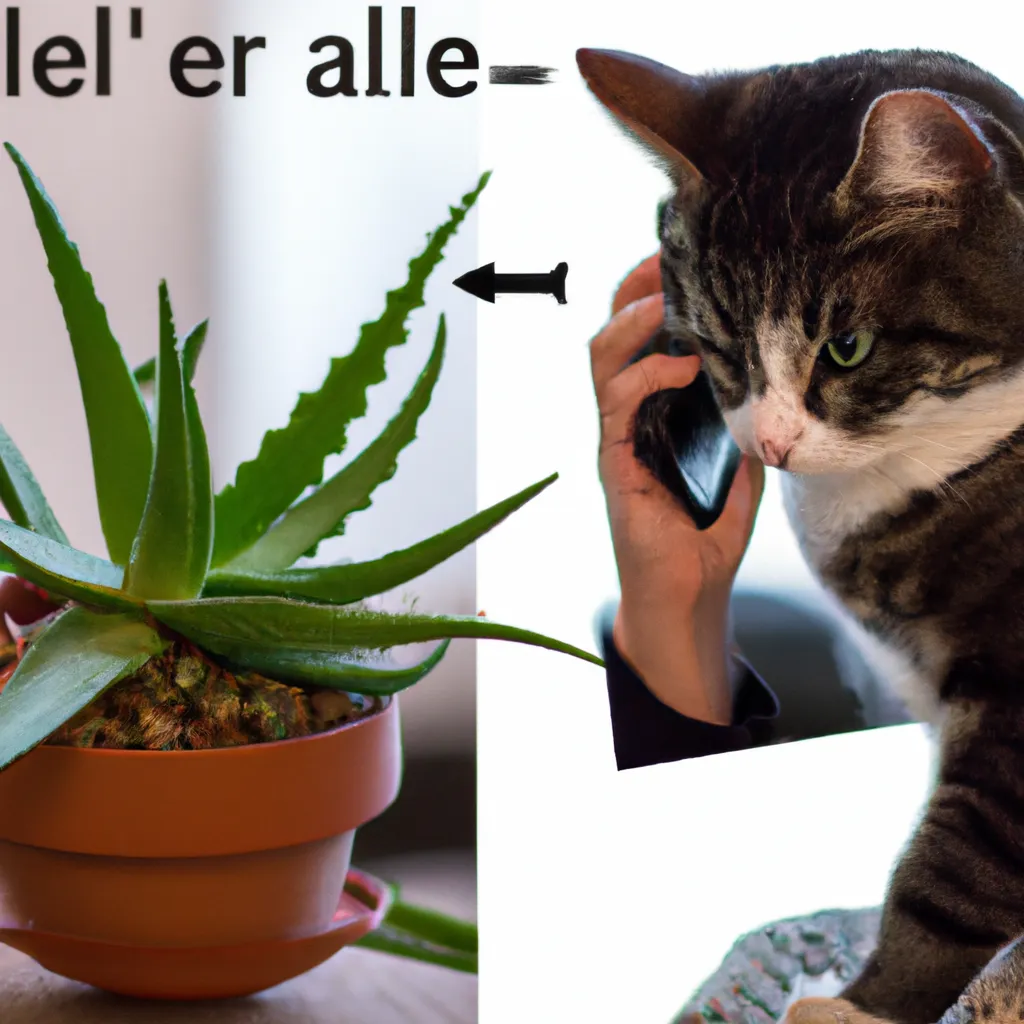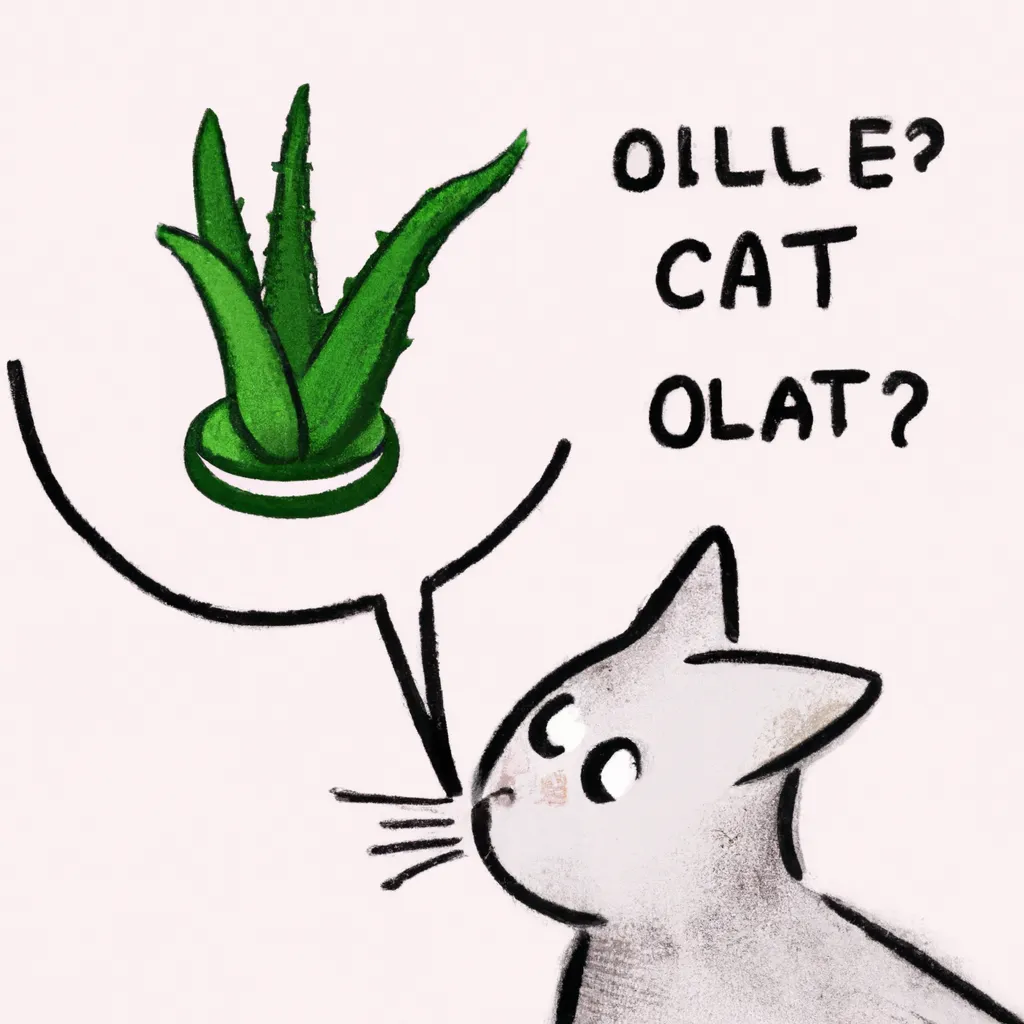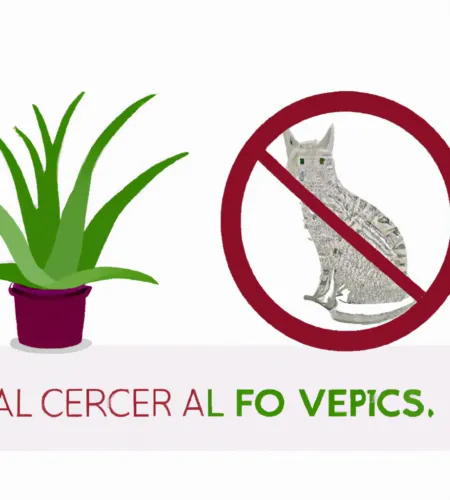Embarking on a feline-centric exploration, we delve into the heart of a question that has been tickling the whiskers of cat owners and enthusiasts alike: Can cats eat aloe? This succulent plant, with its spiky exterior and gel-filled interior, has long been celebrated for its myriad of human health benefits. But when it comes to our purring pals, is aloe a harmless nibble or a perilous snack? This article will unravel this enigma, pawing through the layers of fact and fiction, to provide a comprehensive understanding of the relationship between cats and aloe.
Our feline friends, with their insatiable curiosity and penchant for exploration, often find themselves drawn to a variety of household plants. Aloe, with its alluring, exotic appearance, can be particularly enticing. However, the question remains: Is aloe bad for cats? To answer this, we’ll delve into the potential symptoms of aloe poisoning in cats, and explore the toxic quantities of this succulent plant.
From the tantalizing texture of its leaves to the intriguing aroma of its gel, it’s no wonder cats might find aloe vera irresistible. But do cats actually like aloe? And more importantly, is it good or healthy for them? We’ll dissect these queries, scrutinizing each from a scientific and behavioral perspective.
Whether it’s the potted aloe plant on your windowsill, or the bottled aloe vera gel in your bathroom, we’ll examine each form of aloe, and its potential impact on your feline companion. We’ll also shed light on the immediate steps to take if your cat has ingested aloe, ensuring you’re equipped with the knowledge to respond effectively.
Finally, we’ll explore safe alternatives to aloe for cats, and delve into the world of feline nutrition, answering the ever-important question: What is the best food for cats? So, whether you’re a new cat parent, a seasoned cat lover, or simply curious about feline dietary needs, this article promises to be a treasure trove of insights. Buckle up for a whisker-tingling journey into the world of cats and aloe!
Is aloe Bad for Cats?
Yes, aloe is harmful to cats. Ingesting this succulent plant, often hailed for its medicinal properties in human use, can cause significant health issues in our feline friends. The aloe vera’s gel and juice contain compounds known as anthraquinones, which can lead to symptoms such as vomiting, diarrhea, loss of appetite, and even depression in cats. Therefore, it’s crucial to keep aloe plants out of reach from curious whiskered explorers and avoid using aloe-infused products on them. It’s always best to consult with a vet before introducing new plants or substances into your cat’s environment, ensuring their safety and well-being.
Why is aloe bad for cats?
Though aloe vera is often celebrated for its medicinal properties in human health, it’s a different story when it comes to our feline friends. The issue lies in the fact that aloe contains compounds known as anthraquinones, specifically aloin, which are toxic to cats. When ingested, these compounds can cause a series of adverse reactions, including vomiting, diarrhea, loss of appetite, and changes in urine color. This is because anthraquinones disrupt the normal functioning of a cat’s digestive system, causing discomfort and potentially leading to dehydration if not treated promptly. It’s crucial to remember that cats, unlike humans, lack the necessary enzymes to properly digest aloe, making it a potentially harmful plant for them.
What are the symptoms of aloe Poisoning in Cats?
Recognizing the symptoms of aloe poisoning in cats is paramount for their wellbeing. The initial signs may include gastrointestinal upset such as vomiting or diarrhea, often with a distinct, unusually dark or bloody appearance due to the irritation caused by the aloe. Cats might also show signs of depression, tremors, changes in urine color, and a sudden loss of appetite. In severe cases, they may even exhibit signs of lethargy or weakness, indicating a possible systemic impact. If you suspect your cat has ingested aloe, seek immediate veterinary attention. Early detection and treatment can significantly improve the prognosis and help your feline companion bounce back to their usual playful self.
How much aloe is toxic to cats?
Even a small amount of aloe vera can be toxic to cats, making it imperative for cat owners to be aware of this potential danger. The ingestion of aloe can cause symptoms such as vomiting, diarrhea, loss of appetite, depression, and urinary changes in cats, signifying its toxicity. This is due to the presence of a compound called aloin, which is known for its purgative properties. Despite aloe vera’s numerous health benefits for humans, it’s a different story for our feline friends. This succulent plant, while a soothing balm for human skin and a popular ingredient in many health products, can spell trouble for curious kitties who may be tempted to nibble. Therefore, it’s best to keep aloe plants and products out of paw’s reach, ensuring your beloved pet’s safety. Remember, when it comes to cats and aloe, it’s always better to err on the side of caution, as the line between safe and toxic amounts is thin and easily crossed.
Can Cats Die From aloe?
Yes, cats can potentially die from ingesting aloe. This succulent plant, cherished by many for its medicinal properties, is unfortunately toxic to our feline companions. The aloe vera plant contains compounds known as anthraquinones, which can cause severe vomiting, depression, anorexia, tremors, and, in extreme cases, could lead to death. Therefore, it’s crucial to keep these plants out of reach from curious kitties, or opt for cat-safe alternatives. Although aloe’s toxicity is generally low, repeated exposure or large amounts could lead to serious health issues, including potential fatality. If you suspect your cat has ingested aloe, immediate veterinary attention is paramount to prevent severe consequences.

What to do if cat ate aloe? How to help?
If your cat has ingested aloe, it’s crucial to seek immediate veterinary care since aloe is toxic to cats. Symptoms of aloe poisoning in cats can include vomiting, diarrhea, loss of appetite, depression, and urinary changes. To help your cat, refrain from inducing vomiting unless specifically instructed by a veterinarian. Instead, monitor your cat closely for any signs of distress and provide fresh water to help flush the toxins. Remember, prevention is the best cure, so keep aloe plants and products out of your cat’s reach. This underlines the overarching theme that cats should not eat aloe due to its toxicity.
What will a vet do if a cat is poisoned by aloe?
If a cat is unfortunately poisoned by aloe, the veterinarian will initially stabilize the feline by administering intravenous fluids to prevent dehydration and flush the toxins out of the system. They may also provide activated charcoal to absorb any remaining toxins in the cat’s gastrointestinal tract. The vet will closely monitor the cat’s vital signs and may administer anti-vomiting medication to alleviate any gastrointestinal upset. If the poisoning is severe, the vet might also consider blood transfusions or other supportive treatments to ensure the cat’s recovery. Remember, time is of the essence in these situations, so if you suspect your cat has ingested aloe, contact your vet immediately.
Do cats like aloe?
No, cats don’t generally find aloe appealing. Felines are notoriously finicky eaters and their discerning palates tend to steer clear of the bitter taste of aloe. However, cats are also curious creatures and may nibble on an aloe plant out of curiosity or boredom. It’s important to note that aloe is toxic to cats and can cause vomiting, diarrhea, loss of appetite, and other adverse symptoms, so it’s best to keep your feline friends away from this plant. Instead, provide them with safe, cat-friendly plants to satisfy their natural curiosity and need to chew.
Is aloe good (healthy) for cats?
No, aloe is considered toxic to cats according to the American Society for the Prevention of Cruelty to Animals (ASPCA). This succulent plant contains compounds called anthraquinones, specifically aloin, which can cause a host of symptoms if ingested by cats. These symptoms can include vomiting, diarrhea, loss of appetite, depression, and even tremors. So, while aloe may be a staple in many human health and wellness routines, it’s a substance that should be kept well away from cats.
Can cats eat aloe plants?
No and given the potential harm aloe can cause, it’s clear that cats should not eat aloe plants. Despite their natural curiosity and tendency to nibble on various plants, felines should be deterred from interacting with aloe. If you have aloe plants at home, it’s essential to keep them out of reach of your cats to prevent accidental ingestion. If your cat does ingest aloe, it’s crucial to contact a veterinarian immediately. Remember, while we may enjoy the soothing properties of aloe vera, it can cause a fur-raising experience for our beloved cats. Therefore, it’s always best to err on the side of caution and keep aloe plants away from your feline companions.
Can cats eat aloe vera plants?
No, aloe vera, despite its numerous health benefits for humans, is classified as toxic to cats by the ASPCA (American Society for the Prevention of Cruelty to Animals). The plant contains chemical compounds known as anthraquinones, specifically aloin, which can cause various adverse health effects in cats, including vomiting, diarrhea, loss of appetite, and depression. It’s crucial to keep aloe vera plants out of reach from curious kitties to prevent accidental ingestion.
Can cats eat aloe vera?
No and similarly, the ingestion of aloe vera, whether it’s the plant itself or products derived from it, is not safe for cats. While aloe vera gel is often hailed for its soothing and healing properties in human skincare, it can pose serious health risks when ingested by cats. The aloin found in aloe vera can lead to an array of gastrointestinal issues in cats, such as upset stomach, lethargy, and changes in urine color. If you suspect your cat has consumed aloe vera, it’s essential to seek immediate veterinary attention. In conclusion, while aloe vera may be a staple in many households for its health and beauty benefits, it’s a substance that should be kept well away from our feline companions.
Can cats eat aloe vera plant?
No, cats cannot eat aloe vera plants. The aloe vera plant, often lauded for its medicinal properties in human use, is unfortunately toxic to our feline friends. When ingested, the plant can cause a range of adverse reactions in cats, including vomiting, diarrhea, loss of appetite, depression, and even tremors. The harmful compounds found in the plant, such as anthraquinones, are responsible for these symptoms. So, despite its soothing reputation in the human health world, aloe vera should never be on the menu for your whiskered companions. It’s crucial to remember that what’s beneficial for us might not always be beneficial for our pets.
Can cats eat aloe plant?
No, all varieties of aloe, not just aloe vera, are harmful to cats. The same toxic compounds that make aloe vera dangerous are present in all species of the aloe plant. So, whether it’s aloe vera, aloe arborescens, or any other type of aloe, the rule stays the same – keep these plants out of reach of your feline friends. The best way to ensure your cat’s safety is to be mindful of the plants you have in your home and garden, and always consult with a vet if you’re unsure about a plant’s safety. Remember, curiosity didn’t just kill the cat; it also made it very sick. So, let’s keep our curious kitties safe and sound!
Can cats eat aloe vera gel?
No, cats should not eat aloe vera gel. Aloe vera gel, despite its numerous health benefits for humans, can cause severe health issues in cats. The gel contains saponins and anthraquinones, compounds that are toxic to cats, leading to symptoms like diarrhea, vomiting, depression, anorexia, tremors, and change in urine color. Ingesting aloe vera gel can result in a condition called aloin poisoning, which requires immediate veterinary attention. Therefore, it’s crucial to keep aloe vera gel out of your feline friend’s reach.
Can cats eat aloe vera leaves?
No, cats should not consume aloe vera leaves either. The leaves of the aloe vera plant contain the same harmful compounds found in the gel, including saponins and anthraquinones. Eating aloe vera leaves can lead to the same adverse effects as ingesting the gel, such as gastrointestinal upset, depression, and tremors. Additionally, the outer layer of the leaves is tough and fibrous, posing a choking hazard or potential for gastrointestinal obstruction. As a responsible cat owner, it’s essential to ensure your cat does not have access to aloe vera plants to prevent accidental ingestion.
Can cats eat aloe leaves?
No, cats should not consume aloe leaves. The aloe plant, while beneficial to humans, contains aloin – a compound that can be toxic to our feline friends. Ingesting aloe leaves can lead to symptoms such as vomiting, diarrhea, loss of appetite, and depression in cats. Therefore, it’s essential to keep these plants out of reach or even better, consider alternative, non-toxic plants for your home if you share it with a curious kitty.

Can cats eat aloe gel?
No, cats should not consume aloe gel. While the gel is typically considered the safer part of the plant due to lower aloin concentrations, it can still pose a risk to cats. The potential for toxicity remains, especially if the gel contains any trace of the green outer layer of the leaf where aloin is primarily found. Even commercial aloe products, often marketed for their health benefits, can upset a cat’s digestive system and lead to unwanted side effects. Always prioritize your cat’s safety and consult with a veterinarian before introducing any new substances or foods into their diet.
Are there safe alternatives to aloe for cats?
While aloe vera is renowned for its soothing and healing properties in humans, it can be harmful to cats if ingested. However, there are safe and beneficial alternatives for our feline friends. One such alternative is chamomile, which can be used to soothe skin irritations just like aloe vera. Another alternative is marshmallow root, which has anti-inflammatory properties and can be used to soothe digestive issues. Both chamomile and marshmallow root are safe for cats when used appropriately and can provide similar benefits to aloe vera without the associated risks.
What is the best food for cats?
When it comes to the best food for cats, it’s important to consider their unique dietary needs. Cats are obligate carnivores, meaning they require a diet rich in animal protein. High-quality, grain-free canned food is often recommended by veterinarians as it provides the necessary protein along with hydration. It’s also beneficial to include a small amount of high-quality dry food for dental health. Foods like salmon, chicken, and turkey are great sources of protein for cats. Additionally, make sure to avoid foods that are toxic to cats such as onions, garlic, and chocolate. Always consult with your vet for the most suitable diet plan for your feline companion.
Subscribe to our email newsletter to get the latest posts delivered right to your email.

